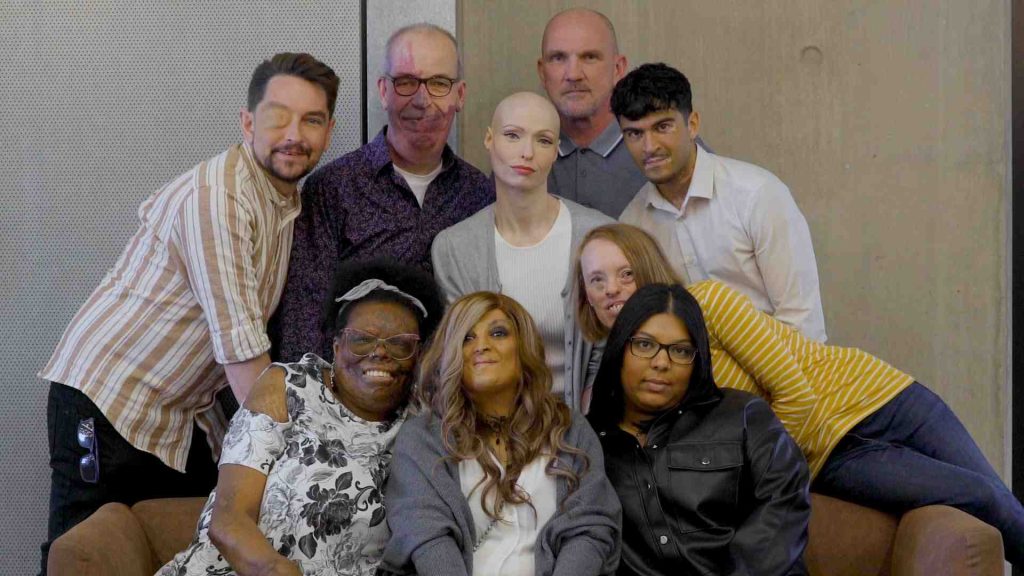In a new poll we commissioned with Focaldata among a representative sample of over 1,500 UK adults, we found:
- More than three-fifths (61%) of people agreed that they would like to see more people with visible differences represented in popular culture.
- Over a third (33%) have never, or not in the last year, seen someone with a visible difference acting in a TV drama, rising to 45% not seeing people with visible differences presenting the news or factual TV programmes.
- Nearly a third (29%) said they had seen in the last month, or in the last year, a character with a visible difference in a film or TV drama as a victim, compared to 16% who had seen a character with a visible difference in a film or TV drama as the hero.
- Over half (53%) of people have never, or not in the last year, seen someone with a visible difference in a job recruitment ad.
- Nearly three-fifths of people (57%) have never, or not in the last year, seen someone with a visible difference in a position of power or authority.
- 58% have not seen anyone with a visible difference as a character in a video game.
To challenge outdated tropes and stereotypes long associated with scars, marks and conditions that affect appearance, our campaigners and ambassadors are speaking out.

Our campaigners and ambassadors are saying ‘This Is Me’
Ambassador Tulsi says: “For far too long people with visible differences and disfigurements have found themselves either ignored by popular culture or presented as victims or villains.
“Some of the most difficult moments I’ve experienced are when I’ve had to deal with the reactions of others to my appearance, from trolling online to abusive comments shouted at me on the street. I can’t be sure whether their rude and discriminatory behaviour was due to fear, ignorance, or hate. But what I do know is that the stigma and negative stereotypes out there that show visible differences and disfigurements as something bad, scary or disturbing are helping to fuel negative attitudes.
“I’m proud of who I am, and I think everyone deserves to see themselves represented positively. If I can be the role model someone else needs to see, to help them feel less isolated or alone, then until popular culture catches up, I’ll put myself out there and say, ‘This Is Me’.”
During Face Equality Week, along with fellow members of the Face Equality International alliance, we are celebrating and championing the rights of those with visible differences and disfigurements to help tackle the social stigma around appearance.
Seeing positive role models is hugely important when so many sections of society are telling you that you don’t fit.
The research also revealed that 37% of the UK adults surveyed think that people with a visible difference may experience difficulty in doing things that they enjoy, like hobbies or sports, whilst 35% think that adults with a visible difference may experience people having low expectations of their abilities.
Our chief executive, Heather Blake, says: “I think everyone can relate to that feeling of being left out, whether it’s being excluded from a game at school, to being rejected from job roles or realising you aren’t invited to an event. When you have a visible difference, you’re often left wondering if that’s because of people’s thoughts about how you look. It’s no wonder people with visible differences tell us they feel self-conscious and anxious when they are contending with outdated views, assumptions about their abilities, and a lack of positive representation across society.
“But we know that there’s an appetite for change, with three-fifths (61%) of people saying that they, like us and our campaigners, would like to see more people with visible differences represented in popular culture. So, whilst brands, businesses, film makers, script writers and marketeers catch up, our campaigners and ambassadors are being the change they and many others, want to see. We’re asking people to join our celebration of difference, share and support our film and real stories from our campaigners, so we all get to see positive representations of ourselves.”
In November 2022, we secured an apology from the BBC after an episode of the popular quiz show, Only Connect, was aired describing scars as ‘marks of shame’. Meanwhile the British Film Institute has been an advocate of better representation of visible difference for some years. In 2018, the BFI committed to not having negative representations depicted through scars or facial difference in the films it funds. Following the Only Connect incident, Changing Faces has asked the BBC to follow suit and make a similar commitment to that made by the British Film Institute.
Ambassador Tulsi adds: “Seeing positive role models is hugely important when so many sections of society are telling you that you don’t fit. Broadcasters have a role to play, but we can all do our bit too, by recognising that differences should be celebrated and respected.”